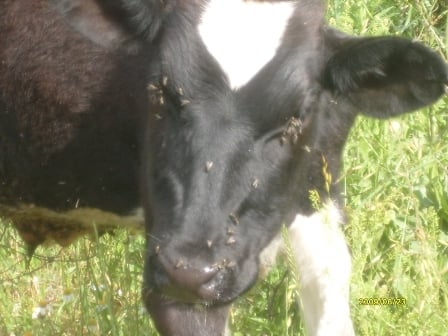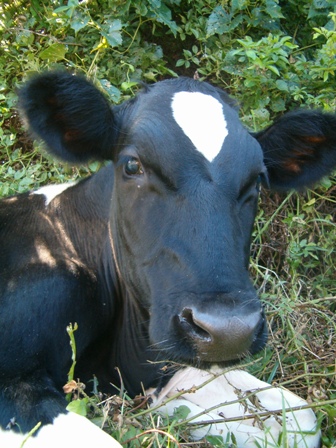A (Truly) Happy Cow
Actually, to be precise, Jerry’s a steer. A PETA investigator found him hobbling around a field and scrounging for weeds at the appallingly filthy Pennsylvania dairy farm we told you about last month. This is how the investigator described the 5-month-old calf in her log:
[I] found a steer at the entrance to the barn (outside of the fence) who looked [to be] in a pitiful condition. He is thin, pot-bellied, buckled over at the front knees and pasterns … and when he looks at you he has a tilt to his head. Flies were covering both of his eyes, which appeared cloudy.
 |
In addition to being crippled, the young calf was crawling with lice and was nearly blind because of pinkeye, a bacterial infection that spreads like wildfire in the disgusting conditions on factory farms. PETA’s investigator bought Jerry and whisked him away to a “safe house” until he could be driven to his new home at a sanctuary.
Although he was initially (and understandably) terrified of humans, we’re told that Jerry became mysteriously calm during the ride to the sanctuary. It was as if he considered the journey to be an adventure and knew that it would end at a safe and loving place.
 |
Jerry has now almost fully recovered and regained most of his sight. He loves to wait outside the back door every evening at dinner time, and he’s become the adopted “big brother” of another calf who was rescued from the same farm. If the younger calf strays too far, Jerry will go off in search of his adopted sibling.
Unfortunately, not all calves are as lucky as Jerry. Most male calves who are born on dairy farms are sent to slaughter, usually after they’ve been confined for up to 23 weeks to cramped veal crates that are intended to prevent the calves from moving so that their flesh will stay unnaturally pale. Making sure that you don’t contribute to their suffering is as easy as giving up dairy foods.
To read a more about Jerry, you can head over to Facebook, where he is featured on our “causes” page.
Written by Alisa Mullins

